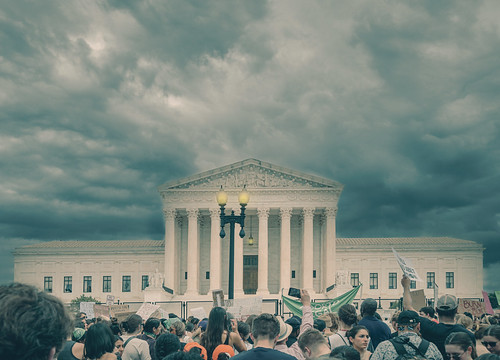
2022.06.24 Roe v Wade Overturned - SCOTUS, Washington, DC USA 175 143307-Edit
(Image by tedeytan) Details DMCA
For the first time in U.S. history, the Supreme Court has retracted a fundamental constitutional right. "We hold that Roe and Casey must be overruled," Samuel Alito wrote for the majority of five right-wing zealots on the court in Dobbs v. Jackson Women's Health Organization. They held that "procuring an abortion is not a fundamental constitutional right because such a right has no basis in the Constitution's text or in our Nation's history."
Since the day Roe v. Wade was decided nearly 50 years ago, its opponents have executed a methodical campaign to overturn it. There is no reason, in fact or in law, to erase the constitutional right to abortion. The Constitution still protects abortion, and there have been no factual changes since 1973 that would support abolishing it. The only thing that has changed is the composition of the court. It is now packed with radical Christian fanatics who have no qualms about imposing their religious beliefs on the bodies of women and trans people, notwithstanding the Constitution's unequivocal separation of church and state.
Alito was joined by Clarence Thomas, Neil Gorsuch, Brett Kavanaugh and Amy Coney Barrett in stripping protection of the right to self-determination from half the country's population.
In their collective dissent, Stephen Breyer, Sonia Sotomayor, and Elena Kagan, said the majority "has wrenched this choice from women and given it to the States." They wrote that the court is "rescinding an individual right in its entirety and conferring it on the State, an action the Court takes for the first time in history."
"the court" is now packed with radical Christian fanatics who have no qualms about imposing their religious beliefs on the bodies of women and trans people, notwithstanding the Constitution's unequivocal separation of church and state."
Noting, "After today, young women will come of age with fewer rights than their mothers and grandmothers had," the dissenters conclude: "With sorrow " for this Court, but more, for the many millions of American women who have today lost a fundamental constitutional protection "we dissent."
During the December oral argument, Sonia Sotomayor expressed concern about how the Supreme Court would "survive the stench" of the overtly ideological overruling of Roe. It will show, she said, that the Court's rulings are "just political acts."
By overturning Roe and Planned Parenthood v. Casey, the court's majority confirmed the significance of Sotomayor's query. While purporting to shift the restriction or abolition of abortion to the states, the court has engaged in a political act. It delegated the fate of a right that had been moored in the Constitution to the political process.
"This conservative court defers to the political process when it agrees with its results," Berkeley Law School Dean Erwin Chemerinsky wrote in the Los Angeles Times, "but the deference vanishes when the conservative justices dislike the states laws."
As Chemerinsky notes, "there was no deference to the political process earlier this week when the conservatives on the court declared unconstitutional a New York law limiting concealed weapons that had been on the books since 1911 or struck down a Maine law that limited financial aid to religious schools."
Brett Kavanaugh insisted in his concurrence that the Constitution is "neither pro-life nor pro-choice." Arguing that it is "neutral" on abortion, he claimed that the issue should be left to the states and "the democratic process." But partisan gerrymandering and the Supreme Court's evisceration of the Voting Rights Act to the detriment of Democrats and people of color belie the court's purportedly "democratic" and "neutral" delegation of abortion to the states.
"partisan gerrymandering and the Supreme Court's evisceration of the Voting Rights Act to the detriment of Democrats and people of color belie the court's purportedly 'democratic' and 'neutral' delegation of abortion to the states."
The court held in Roe that abortion was a "fundamental right" for a woman's "life and future." It said that states could not ban abortion until after viability (when a fetus is able to survive outside the womb), which generally occurs around 23 weeks. Nineteen years later, the court reaffirmed the "essential holding" of Roe in Casey, saying that states could only place restrictions on abortions if they don't impose an "undue burden" on the right to a pre-viability abortion.
Alito wrote in Dobbs that since abortion is no longer a fundamental constitutional right, restrictions on it will be judged under the most lenient standard of review - "the "rational basis" test. That means a law banning or restricting abortion will be upheld if there is a "rational basis on which the legislature could have thought that it would serve legitimate state interests."
(Note: You can view every article as one long page if you sign up as an Advocate Member, or higher).





